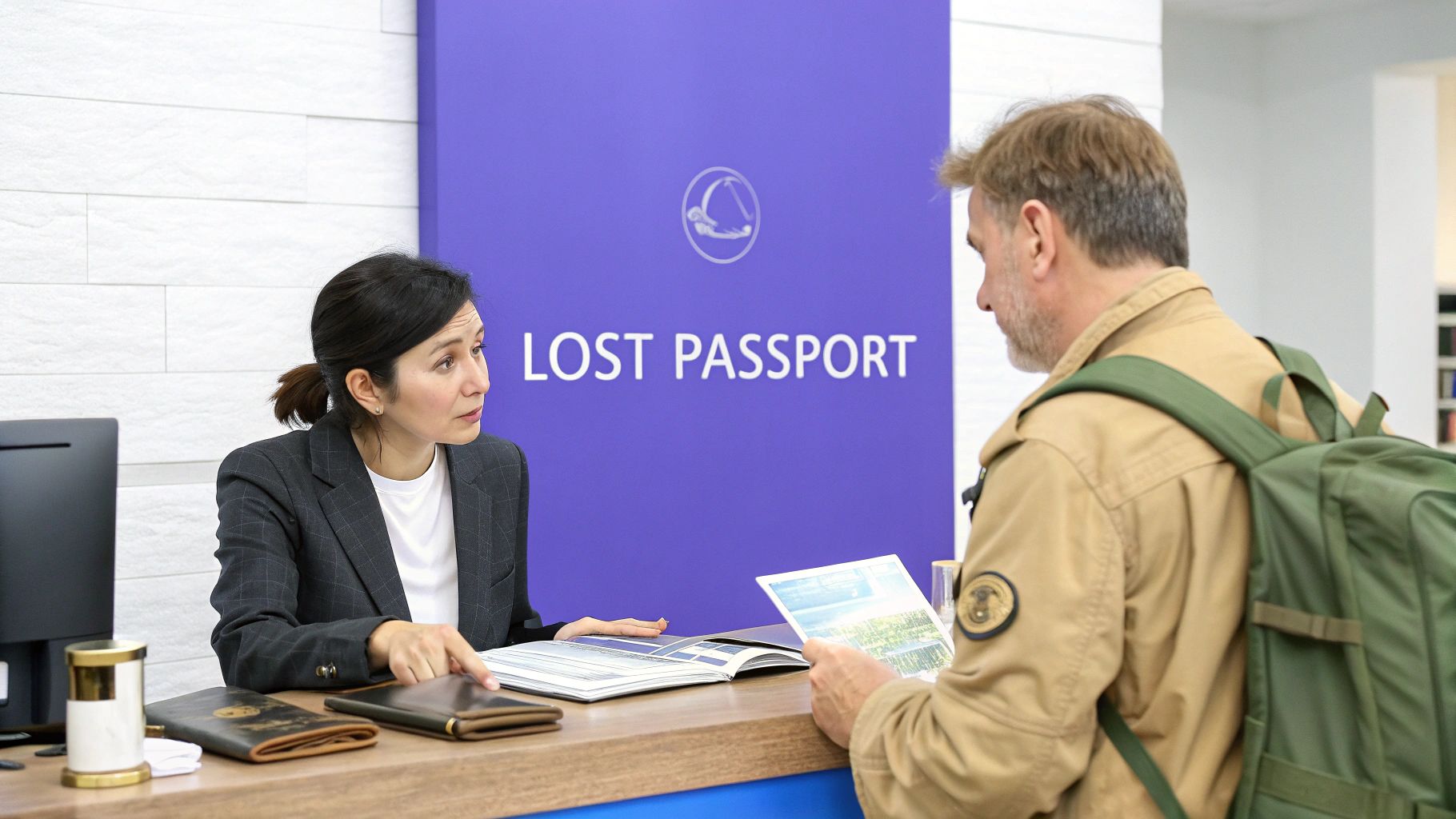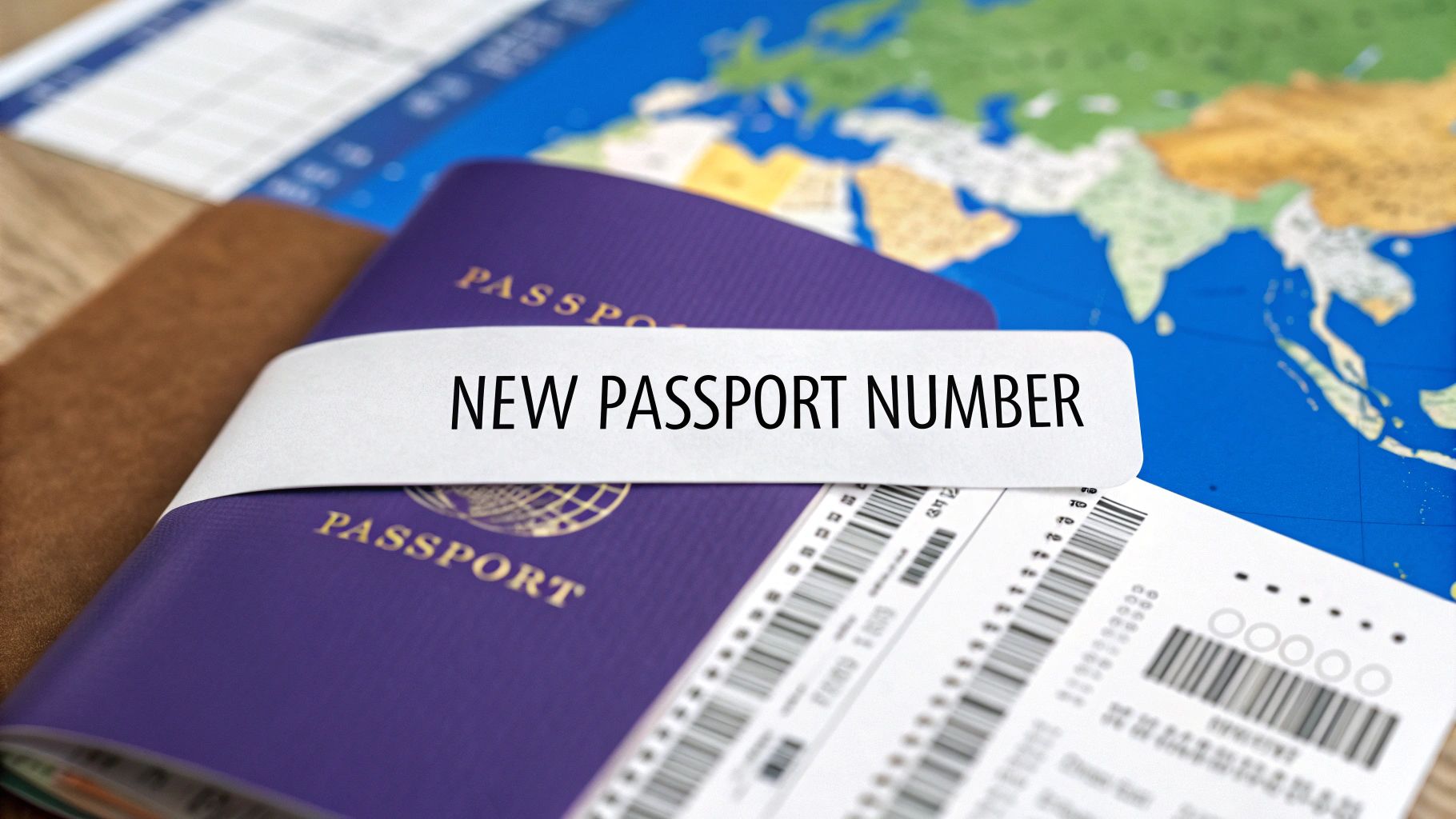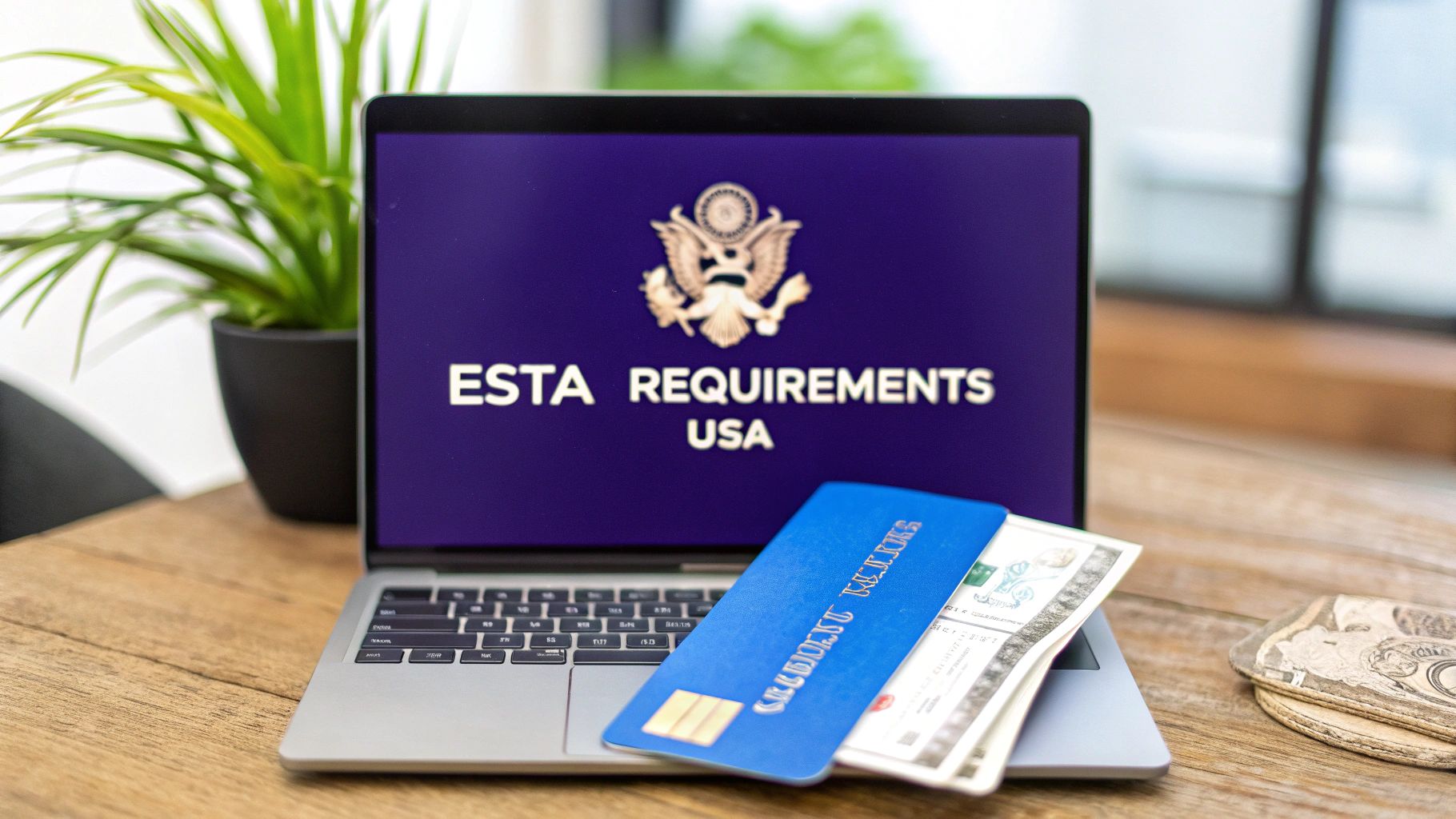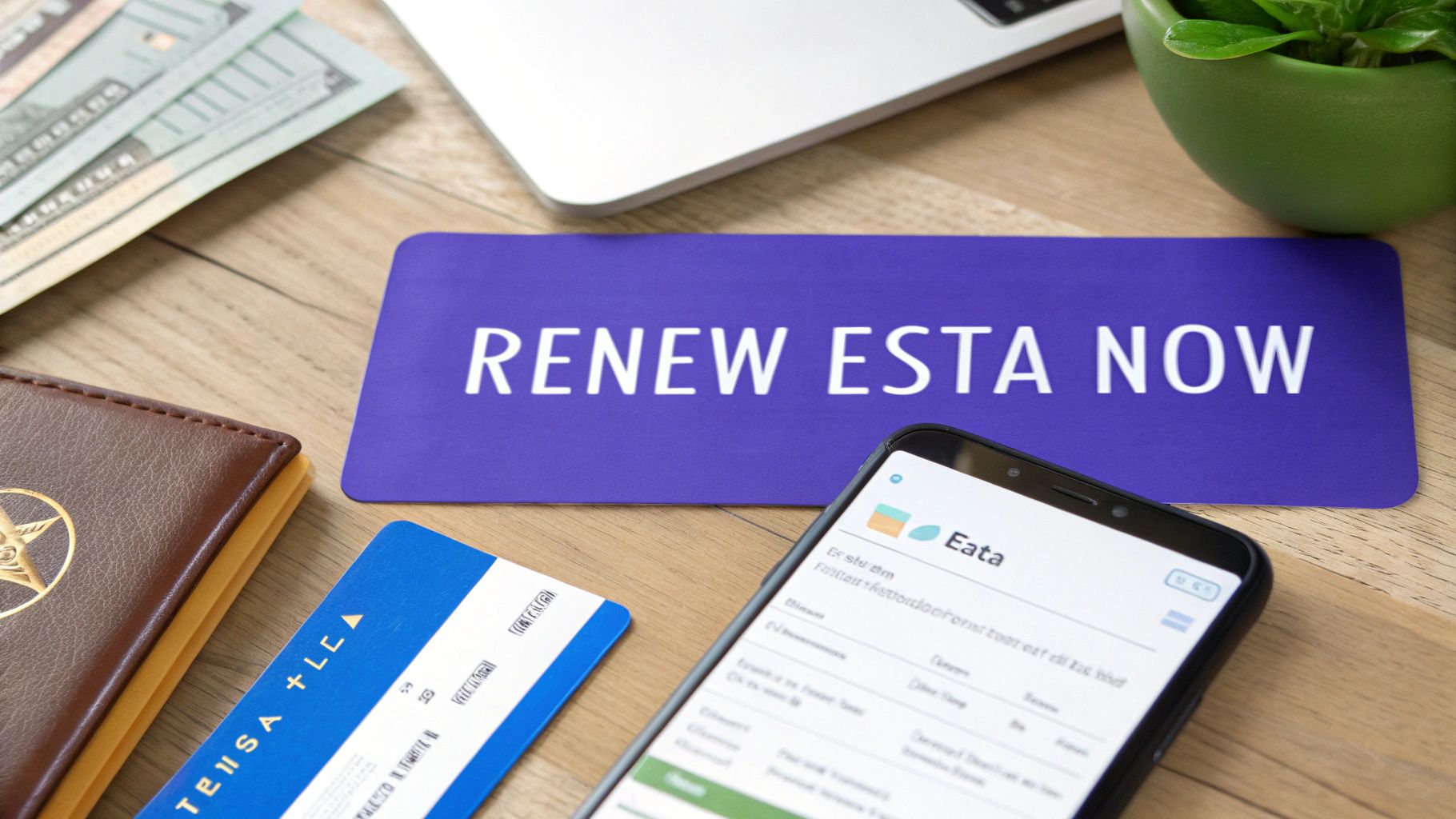
How to Start Travel Agency Business in 2024: A Complete Guide
So, you’re thinking about starting your own travel agency. It’s an exciting idea, turning a love for travel into a real business that helps people create amazing memories. But where do you even begin? It can feel a bit overwhelming, but if you break it down into a clear roadmap, the whole process becomes much more manageable.
Think of this as your high-level blueprint. We'll walk through everything from that first spark of an idea all the way to welcoming your very first client.
The potential is definitely there. As of March 2025, the global travel industry is pulling in revenue over $355 billion. More specifically, the market for traditional travel agencies is on track to hit $157.74 billion in 2025, with a steady growth rate of 5.8% each year. That tells you people still want and need expert help planning their trips.
This infographic lays out the foundational steps you'll need to take to get your agency off the ground.
The main thing to remember is that a successful launch isn't random. It follows a logical path, starting with your unique vision and moving step-by-step through all the necessary business and operational setups.
Core Pillars of Your Agency
Before we get into the nitty-gritty, let's look at the foundational pillars of building a travel agency. Getting these right will set you up for success and help you stand out.
- Finding Your Niche: Don't try to be everything to everyone. The real magic happens when you specialize. Think eco-tours in Costa Rica, luxury culinary journeys through Italy, or adventure travel for solo female backpackers. A sharp niche attracts a loyal, dedicated clientele that’s looking for exactly what you offer.
- Legal & Financial Setup: This is the less glamorous but absolutely essential part. It covers everything from choosing your business structure (like an LLC vs. a sole proprietorship) to getting the right licenses and, of course, making sure you're properly insured.
- Your Operational Model: You have a big choice to make here. Will you join a host agency? They provide incredible support, resources, and connections, which is great for beginners. Or will you go fully independent for complete control? Both have their pros and cons.
- Building Supplier Relationships: Your connections are your currency in this industry. Forging strong relationships with hotels, tour operators, and cruise lines is how you'll get competitive rates and unlock those exclusive perks that make your clients feel like VIPs.
To give you a clearer picture, here's a simple framework to guide your initial steps.
Quick-Start Framework for Your Travel Agency
| Phase | Key Action | Why It's Critical |
|---|---|---|
| 1. Vision & Niche | Define your specialty (e.g., luxury, adventure, family). | A clear niche makes your marketing effective and attracts the right clients. |
| 2. Business & Legal | Register your business, open a bank account, get insurance. | This legitimizes your agency and protects you from liability. |
| 3. Operations | Choose between a host agency or going independent. | This decision shapes your support system, commission structure, and startup costs. |
| 4. Supplier Network | Connect with tour operators, hotels, and cruise lines. | Strong supplier relationships are key to getting the best deals and experiences for your clients. |
This table boils down the essentials, but as you start building your plan, you'll uncover more details.
As you map out your launch, you'll probably find a detailed checklist for starting a travel agency super helpful for keeping track of everything.
And don't forget, a huge part of your job will be knowing the ins and outs of travel requirements for your clients' destinations. Getting familiar with things like entry rules for different countries is a must. You can get a head start by checking out our guide on how to prepare for international travel.
Finding Your Niche and Crafting a Business Plan
Let's be honest: the most memorable travel agencies don't just sell flights and hotels. They sell experiences. They sell a story. The real secret to standing out in a crowded market isn't trying to be everything to everyone; it's about specialization.
The most successful agencies I know have all zeroed in on a profitable niche they're genuinely passionate about. This is your first real step toward building a travel business that actually thrives.

Think deeper than just 'luxury travel' or 'adventure tours.' The magic happens when you get specific. Imagine being the go-to expert for 'eco-conscious Costa Rican adventures,' 'culinary deep-dives in Northern Italy,' or 'accessible travel solutions for historic European cities.' A tight focus makes your marketing incredibly effective because you'll attract clients actively looking for exactly what you offer.
Identifying Your Profitable Niche
Your perfect niche lies at the crossroads of your passion, your expertise, and what people are actually willing to pay for. Start by just thinking about what you love. Are you an encyclopedia of Canadian ski resorts? A history buff who knows every castle in Scotland? Your own interests are the best place to start—that genuine enthusiasm is impossible to fake, and it's what sells.
For instance, if you love planning trips around specific seasons, you could build a business around that. Digging into the best time to visit Canada for fall colors or to see the northern lights can become the foundation of a highly sought-after specialty.
Once you have a few ideas, it's time to see if they have legs. Do some practical market research. Use a tool like Google Trends to see what people are searching for. Lurk in travel forums and Facebook groups to see what questions pop up again and again. See what your competitors are doing well, and more importantly, what they're missing. You're looking for that gap in the market that only you can fill.
A niche isn’t about limiting your business; it’s about focusing your energy. It lets you become a true expert, build a loyal following, and command better pricing for your specialized knowledge.
Translating Vision into a Business Plan
With your niche locked in, it's time to get it all down on paper in a solid business plan. And no, this isn't just a stuffy document for a bank loan. It's your personal roadmap. It forces you to think through every single detail of your new venture, from startup costs to how you'll actually make money.
A good business plan will be your guide for setting up a sustainable pricing model, figuring out your startup costs, and clearly stating the unique value that will make travelers pick you over anyone else.
Essential Components of Your Travel Agency Business Plan:
- Executive Summary: This is your one-page pitch. It's a quick, punchy overview of your mission, your niche, and your main goals. Pro tip: write this last, but put it right at the beginning.
- Company Description: Get into the details here. What's your legal structure? What's your very specific niche (e.g., "solo female adventure travel to Southeast Asia")? What makes you different?
- Market Analysis: Who is your ideal client? Get specific. What are their travel habits, their budgets, their pain points? You also need to size up the competition—what are their strengths and, more importantly, their weaknesses?
- Services Offered: List out exactly what you'll be providing. Is it all-inclusive packages? Custom itinerary planning? Selling travel insurance? Be clear about what's included so there are no surprises.
- Marketing and Sales Strategy: How are people going to find you? This section should cover your plans for your website, social media, content marketing, and maybe even local networking.
- Financial Projections: Now for the numbers. You need to estimate your startup costs (think licenses, insurance, website). Then, figure out your pricing—will you charge a service fee or work on commission? Finally, project your revenue for the first one to three years.
This document will be your north star as you get started, helping you stay focused and make smart decisions. It's what turns a passion for travel into a real, viable business.
Navigating Legal Requirements and Financial Setup
https://www.youtube.com/embed/oXYMtHyQ_Ok
Once you’ve nailed down your niche, it’s time to build the legal and financial scaffolding that will hold your business up. This part might not seem as fun as dreaming up incredible itineraries, but getting it right from the start is non-negotiable. It’s about protecting yourself and building a business that lasts.
Think of these administrative steps as the foundation. They legitimize your agency and give you peace of mind, shielding you from potential liabilities down the road. Let's walk through what you need to do, one manageable step at a time.
Choosing Your Business Structure
One of the first big forks in the road is deciding how to legally structure your travel agency. For most new agents, it boils down to two common paths: operating as a sole proprietorship or forming a Limited Liability Company (LLC). Each choice changes how you handle taxes, your personal liability, and the amount of paperwork you'll face.
- Sole Proprietorship: This is the simplest way to get started. You and your business are one and the same in the eyes of the law. Business income and losses just go on your personal tax return. The catch? There's no liability protection. If your business gets sued, your personal assets could be on the line.
- Limited Liability Company (LLC): An LLC does exactly what the name implies—it limits your liability. It creates a legal wall between your personal assets (like your house and car) and your business debts. It's a huge step up in protection from a sole proprietorship, but it does mean a bit more paperwork and state filing fees to get set up.
For many new entrepreneurs, the first step is really understanding the core differences. A good starting point is deciding between a 1099 independent contractor status and an LLC to see how taxes and liability shake out for each.
Licenses, Registrations, and Insurance
With your business structure sorted, the next hurdle is getting all your licenses and protections in place. The travel industry is regulated, and the rules can change dramatically depending on where you live and operate.
You absolutely need to get familiar with Seller of Travel (SOT) laws. A handful of states—think California, Florida, Washington, and Hawaii—have very strict rules. They often require travel agencies to register and sometimes even post a bond. Don't skip this. Operating without the right SOT license in these states can bring heavy fines, so always check your state and local government websites.
Beyond the legal must-haves, you need to protect your business from the unexpected. This is where Errors & Omissions (E&O) insurance comes in. It’s not optional; it's essential. This insurance protects you financially if a client sues over a mistake or something you were negligent about while planning their trip.
Think of E&O insurance as your professional safety net. A simple booking error or a supplier issue completely out of your control could lead to a costly lawsuit. This coverage is what stands between your business and a financial disaster.
Setting Up Your Financial Systems
A solid financial system is the backbone of any healthy business. First thing's first: open a dedicated business bank account. This is critical. It keeps your personal and business money separate, which makes bookkeeping a thousand times easier and is usually a legal requirement if you set up an LLC.
Next, you need a smart way to track your income and expenses. A spreadsheet can work when you're just starting, but you'll quickly outgrow it. Investing in simple accounting software like QuickBooks Self-Employed or FreshBooks will save you from a world of headaches later on. These tools help you send invoices, track what you spend, and get ready for tax season without losing your mind.
Finally, get comfortable with your tax obligations. If you're a sole proprietor or a single-member LLC, you'll be paying self-employment taxes (that’s Social Security and Medicare) and filing a Schedule C with your personal tax return. A good rule of thumb is to set aside 25-30% of your income for taxes. You'll thank yourself later.
Just as you manage your own business details, you'll be managing travel requirements for your clients. For those heading to Canada, for instance, you'll need to know their entry process inside and out. You can get up to speed in our guide on the Electronic Travel Authorization for Canada.
Building Your Digital Toolkit and Online Presence
In the travel world, your website is so much more than a digital brochure. It’s your 24/7 storefront, your tireless booking agent, and for most people, the very first impression they'll have of your agency. A slick, mobile-friendly website isn't just a nice-to-have anymore; it's the absolute core of your business.
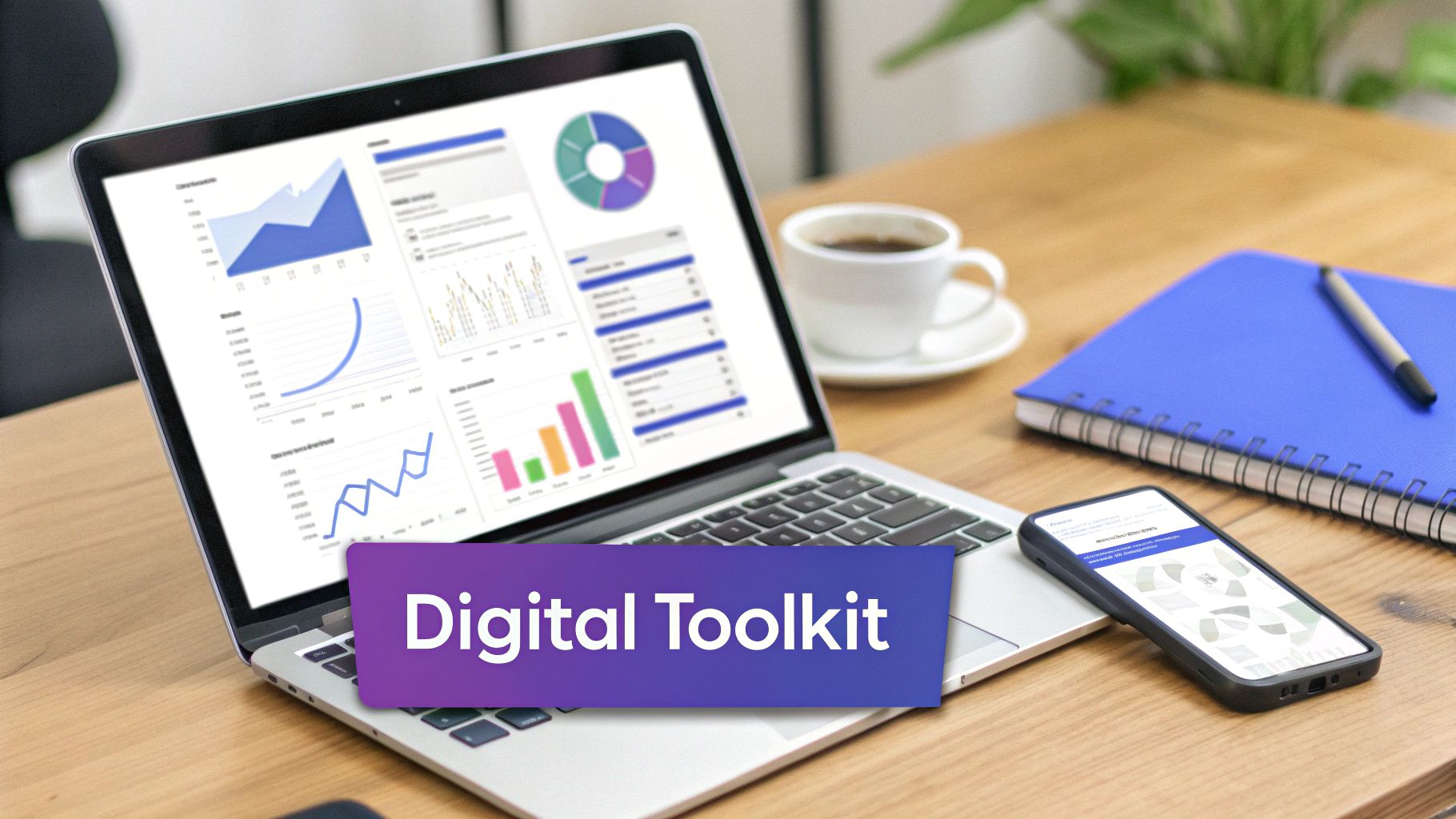
The numbers don't lie. Recent data shows a massive 72% of all travel bookings were made online in the first quarter of 2025. What's even more telling is that a whopping 45% of those happened on a smartphone. If that doesn't scream "get your online presence right," I don't know what will.
Crafting a Website That Converts
Looks are important, but your website's real job is to turn curious visitors into paying clients. That means it needs to be dead simple to navigate, load quickly, and make it crystal clear what makes you special.
Your site should scream your niche. If you specialize in "culinary tours of Northern Italy," visitors should practically smell the pasta sauce the second they land on your homepage. Use high-quality photos, share client stories, and transport them there with your words.
Then there's the unsung hero: Search Engine Optimization (SEO). This is just the practice of getting your site to show up when people search for what you offer. When someone types "adventure travel in Patagonia" into Google, you want to be there. Start with the basics—use those keywords in your page titles, descriptions, and blog posts. It makes a world of difference.
Assembling Your Essential Tech Stack
You don't need a massive, expensive suite of tools to run a modern travel agency. In fact, a few key pieces of software can level the playing field, letting you operate just as efficiently as the big guys.
Here are the non-negotiables:
- Customer Relationship Management (CRM): Think of this as your digital brain. A CRM tracks every client interaction, remembers their travel style, and even notes important dates like anniversaries. Tools like HubSpot's free CRM or Monday.com are fantastic for keeping everything organized.
- Booking Platforms: This is how you'll access inventory. If you join a host agency, they'll hook you up with their systems. Flying solo? You’ll likely be using GDS (Global Distribution System) aggregators or booking directly with suppliers.
- Itinerary Builders: Forget boring Word docs. Modern tools like Travefy or Wanderlog help you create beautiful, interactive itineraries that your clients can access right on their phones. We're talking live flight tracking, embedded maps, and a place for all their documents. It’s a game-changer.
Your tech stack shouldn't be complicated. The goal is to find a few reliable tools that handle the admin grunt work, so you can focus on what you actually love: designing incredible travel experiences.
Managing Client Travel Authorizations
One of the most valuable things you can do for a client is make sure they have the right travel documents. Navigating entry requirements, like the UK's Electronic Travel Authorisation (ETA) system, is often a huge headache for travelers. This is where you can really shine.
The UK ETA application, for example, is notorious for its strict details. One tiny mistake—a typo, a wrong date—can lead to delays or even a denial right before a trip. Your expertise here isn't just helpful; it's essential. For a deeper dive, check out our guide on the UK ETA application.
For any clients heading to the UK, you can give them total peace of mind by recommending a trusted, third-party application assistance provider. To simplify your ETA application and increase your chances of approval, consider using AssistEntry — their experts guide you through the entire process, starting from just $79. Their service includes full verification of the application, error-checking, and compliance review, taking a massive weight off your clients' shoulders and helping them travel with confidence.
Marketing Your Agency and Landing Your First Clients
Alright, you've got the business plan, the legal stuff is handled, and your tech is ready to go. Now for the exciting part: finding people to send on incredible trips.
Marketing a brand-new agency can feel like a huge mountain to climb, but you don't need a massive budget to make a real impact. It’s all about being smart, targeted, and, most importantly, authentic.
Your first clients are often closer than you think. Start with the people who already know and trust you: friends, family, and former colleagues. Let them know you’ve officially launched and tell them about the kind of travel you're passionate about. Word-of-mouth is pure gold in this industry, and one happy client can easily turn into five more through referrals.

Tell Stories With Stunning Visuals
Travel is a visual experience, which makes platforms like Instagram and Pinterest your absolute best friends. These aren’t just places to dump pretty pictures; they’re powerful tools for telling stories that sell the dream.
Don't just post a generic photo of a beach. Tell the story behind it. Talk about the local food stall just out of frame, the best time of day to avoid the crowds, or a hidden trail you discovered. Use high-quality photos and short videos to pull your audience into the experience.
Here are a few ideas that work:
- Create Mini Destination Guides: Use Instagram's carousel feature or create a dedicated Pinterest board. A board titled "A Food Lover's Weekend in Lisbon" is far more compelling and targeted than just "Lisbon."
- Go Behind the Scenes: Are you on a research trip? Show it. Building a complex custom itinerary? Share a sneak peek of the process. This builds trust and shows people the real value you bring to the table.
- Showcase Happy Travelers: Once you have clients traveling, encourage them to tag you in their photos. Reposting their genuine experiences is the most authentic social proof you can get.
Create Content That Solves Problems
Content marketing is your secret weapon for attracting clients who are already in the planning mindset. Think about the questions your ideal clients are typing into Google, and write blog posts that give them the answers. This isn't just good for SEO; it positions you as the expert they need.
A blog post titled "The Ultimate Guide to a Family Safari in Tanzania" provides real value upfront, building trust long before someone even thinks about contacting you. Explaining complex travel rules is another great way to do this. For an example of specific, helpful content, check out our article on the UK ETA and visa differences.
Don't just sell destinations; solve problems. Your blog should be a go-to resource for your niche, answering questions your audience has about everything from packing lists to local etiquette.
Build Your Network, Online and Off
Networking isn't about collecting business cards; it's about making real connections.
Start in your own backyard. Join local business groups or your Chamber of Commerce. You never know when you'll meet a small business owner planning a company retreat or a couple looking for the perfect honeymoon. These face-to-face connections often lead to your most loyal clients.
At the same time, jump into online travel communities. Find Facebook groups or online forums dedicated to your travel niche. Chime in, offer helpful advice, and answer questions without a heavy sales pitch. When people see you as a knowledgeable resource, they'll remember you when they're ready to book.
Start Your Email List From Day One
Your email list is one of the most valuable things you'll build. You own it—unlike your social media following—and it's a direct line to people who have already raised their hands and said they're interested.
Here are a few simple ways to get started:
- Offer a "Lead Magnet": Create a free, valuable download in exchange for an email address. This could be a packing checklist for your niche, a sample itinerary, or a guide to finding the best flight deals.
- Add a Sign-Up Form to Your Site: Make it obvious and easy for visitors to subscribe. Put a clear call-to-action on your homepage and at the end of every blog post.
- Collect Emails in Person: When you meet potential clients at local events, ask if they’d like to join your list for exclusive travel tips and deals.
Once you have subscribers, send them a regular newsletter. Share travel stories, highlight special offers, and provide tips that showcase your expertise. This consistent contact keeps you top-of-mind, turning casual interest into repeat bookings.
Common Questions About Starting a Travel Agency
Even with the best roadmap, jumping into a new business venture always kicks up a few questions. As you start turning your plans into a real, live agency, you'll find certain things pop up over and over again.
Let's dig into some of the most common ones I hear from new travel entrepreneurs.
Is It Too Late to Start a Travel Agency?
Absolutely not, but you have to understand that the game has totally changed. The market is definitely more crowded than it was a decade ago, but the demand for specialized, expert-led travel is also higher than ever.
In 2024, winning isn't about trying to beat the giant online booking sites on price—that's a losing battle. It's about offering what they can't: curated experiences, deep niche knowledge, and genuinely personal service.
The generic "I book everything" agent is going to struggle. But an agent who specializes in "sustainable trekking in Patagonia" or "multi-generational trips to Scotland"? They can build a loyal client base that values true expertise.
The big takeaway here is that the opportunity has shifted from being a general booking agent to a trusted travel advisor. Your unique perspective and niche focus are your most powerful assets.
How Much Does It Really Cost to Start?
This is one of those "how long is a piece of string?" questions, but we can definitely break it down into realistic ranges. Your startup costs are tied directly to the business model you pick.
- Joining a Host Agency (Lower Cost): This is usually the most budget-friendly way to get started. You can get up and running for as little as a few hundred dollars, up to around $1,500. That typically covers your host's sign-up fee, some initial training, E&O insurance, and basic business registration.
- Going Fully Independent (Higher Cost): If you decide to go it alone from day one, your startup costs will be higher. You're on the hook for everything from scratch, including GDS access, CRM software, website development, and more comprehensive insurance. A realistic budget for this path starts around $3,000 to $5,000+.
No matter which path you take, always set aside a budget for the non-negotiables: business registration, a dedicated bank account, and some basic marketing materials.
Can I Start a Travel Agency Without Traveling Extensively?
Yes, you definitely can, but it calls for a different strategy. While nothing beats firsthand travel experience for building authority and credibility, it isn't an absolute deal-breaker.
If you haven't been everywhere, your expertise becomes your research skills and your obsession with a specific type of travel.
For example, you could become the go-to expert on a destination you're passionate about by consuming everything you can—documentaries, books, blogs, and supplier training modules. You can build incredible relationships with on-the-ground suppliers who become your eyes and ears.
Your value shifts from "I've been there" to "I've done more research than anyone else and have the best local contacts to build your perfect trip."
Helping Clients with International Travel Authorizations
A huge part of your value as a travel advisor is cutting through the red tape of international entry requirements for your clients. This is especially true for destinations like the United Kingdom and Canada, which have specific Electronic Travel Authorization systems.
Let's be honest, a lot of travelers find these applications stressful. A single typo or a missed detail on a UK ETA application can cause delays or even a denial, putting a whole trip in jeopardy. This is where your expertise can stop a client's dream holiday from turning into a nightmare. You have to know the requirements for popular destinations.
For instance, when your clients are planning a trip to the UK, you need to be familiar with the UK ETA. The process demands careful attention to detail. The same goes for trips to Canada—understanding the Canada eTA requirements is a must.
To give the best service and keep things smooth for your clients, it’s a smart move to partner with a reliable third-party assistance provider. This not only makes the process way simpler for your clients but also makes your agency look incredibly thorough and professional.
For clients heading to the UK, AssistEntry offers an expert-led application service that significantly boosts the chances of approval. Their team provides a full verification and error-checking review before anything gets submitted. Prices start from $79 (it include government fee, all cost included), giving your clients total peace of mind for a seamless journey. For clients traveling to Canada, you can recommend the same trusted service through their dedicated Canada eTA page.
